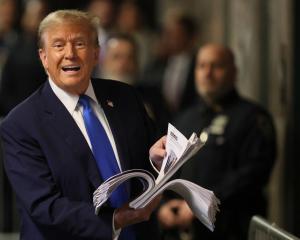Renzi has promised a rapid programme of reforms, pledging to tackle the electoral and constitutional system, overhaul the public administration and reform labour market and tax rules, all within four months of taking office.
"The work's going well, we're relaxed," Graziano Delrio, Renzi's right-hand man in the coalition talks, told reporters as meetings began to form Italy's 65th government since World War Two. "We'll be ready by the weekend."
Talks began in the morning with the smaller parties in the current ruling coalition, but the most important meeting was in the evening between Renzi, who leads the Democratic Party (PD), and Angelino Alfano, leader of the centre-right NCD party, whose support will be vital to forming majority in parliament.
Speaking to reporters afterward, Alfano confirmed the NCD's support for a Renzi government with some conditions. He ruled out a "wealth tax" that some in the PD desire, and said he wanted an economy minister that agreed with his party's aims.
"We want someone (in the economy ministry) who is not against our proposals, but who, like us, holds them dear," Alfano said, declining to name any possible candidates.
After Renzi concludes consultations with parliamentary groups on Wednesday morning, Alfano said the parties planning to support the government will hold a meeting in the afternoon to see if their visions for economic reforms are compatible.
Though Alfano's conditions do not appear to be insurmountable, Renzi, the 39-year-old mayor of Florence, has begun to experience some of the difficulties of Roman politics as he tries to build a cabinet with some high profile candidates ruling themselves out.
As Alfano confirmed, the economy ministry has attracted particular scrutiny. It is unclear whether Renzi will appoint a politician with the experience of running a large department or turn to another technocrat to succeed the outgoing minister, former Bank of Italy official Fabrizio Saccomanni.
Lucrezia Reichlin, a highly regarded professor at the London Business School who is in the running to become deputy governor of the Bank of England, has been widely tipped but has so far given no clear signal of her intentions.
There was embarrassment on Monday when a radio station made a prank call to Fabrizio Barca, a minister under former Prime Minister Mario Monti who had been seen as a potential candidate but who expressed frustration with Renzi.
"There's no idea at all behind this, there's such a level of recklessness. Since there are no ideas, we're just seeing slogans," Barca told the caller, who was posing as Nichi Vendola, the leader of the small Left Freedom Ecology party.
"I'm really worried, it's amazing how the whole thing is completely crumbling apart," he said.
After dropping previous pledges that he would only seek office through an election, Renzi's ruthless removal of his predecessor Enrico Letta, the cautious moderate named after last year's deadlocked election, has raised pressure from the start.
He has been deeply critical of Letta's slow progress with reforms to the economy which is struggling to recover from its worst economic slump since World War Two and must now show results quickly.
After being asked to form a government on Monday, Renzi pledged one major reform a month up to May but details remain sketchy on key points including his willingness to adhere to the strict budgetary discipline demanded by Italy's European Union partners.
Filippo Taddei, one of his main economic advisers, said the focus would be on cutting spending and reducing taxes on labour costs which he said were too high with respect to taxes on financial income.
"We want to cut taxes overall, starting with taxes on labour," he told Canale 5 television.
He said welfare protection for the unemployed would be beefed up. But he would not scrap a much-disputed article of the labour code which protects workers from unjustified dismissal, a key stumbling block in past efforts to overhaul a system blamed for overprotecting employees on full contracts at the expense of part-time and short-contract workers.
Financial markets appear to have welcomed Renzi's arrival, with borrowing costs dropping to levels not seen since before the outbreak of the eurozone debt crisis. Yields on 10 year government bonds were at around 3.6 percent in morning trade on Tuesday, near their lowest level since 2006.












